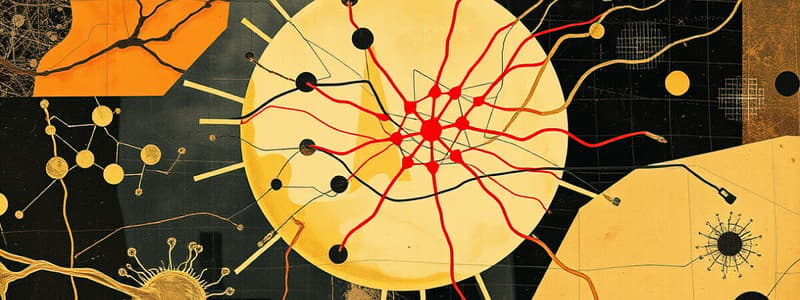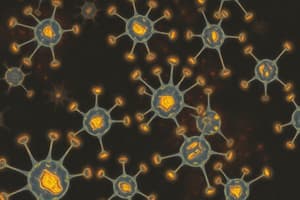Podcast
Questions and Answers
What is the primary purpose of intracellular communication?
What is the primary purpose of intracellular communication?
- To enable direct passage of molecules between cells
- To allow hormones to function as neurotransmitters
- To propagate signals and regulate cellular responses (correct)
- To regulate communication between distant organs
Which of the following best describes intercellular communication mechanisms?
Which of the following best describes intercellular communication mechanisms?
- Propagation of signals using second messengers like cAMP
- Direct cell-to-cell connections enabling molecular transfer (correct)
- Activation of ligand gated ion channels within target cells
- Regulation of transcription factors within a single cell
Which example illustrates paracrine signaling?
Which example illustrates paracrine signaling?
- Cells releasing factors affecting nearby cells in the same tissue (correct)
- Hormones traveling in the bloodstream to distant targets
- Endocrine glands releasing hormones into the lymphatic system
- A nerve signal triggering muscle contraction locally
Which molecules are considered second messengers in signaling pathways?
Which molecules are considered second messengers in signaling pathways?
What type of receptor is most likely to be involved in gene expression regulation via intracellular communication?
What type of receptor is most likely to be involved in gene expression regulation via intracellular communication?
Which statement about signal transduction pathways is accurate?
Which statement about signal transduction pathways is accurate?
Which type of communication involves the release of hormones that travel through the bloodstream?
Which type of communication involves the release of hormones that travel through the bloodstream?
What is the role of receptors in intercellular communication?
What is the role of receptors in intercellular communication?
What is the immediate consequence of ligand binding to EGFR?
What is the immediate consequence of ligand binding to EGFR?
Which protein is directly recruited to the phosphorylated tyrosines on EGFR?
Which protein is directly recruited to the phosphorylated tyrosines on EGFR?
Which protein facilitates the exchange of GDP for GTP on Ras?
Which protein facilitates the exchange of GDP for GTP on Ras?
What role does ERK play after being activated in the MAP kinase cascade?
What role does ERK play after being activated in the MAP kinase cascade?
Which of the following is recognized as a therapeutic target for cancer treatment related to the PI3K-AKT signaling pathway?
Which of the following is recognized as a therapeutic target for cancer treatment related to the PI3K-AKT signaling pathway?
What occurs after GTP binds to the G-protein?
What occurs after GTP binds to the G-protein?
Which G-protein subunit is responsible for activating adenylate cyclase?
Which G-protein subunit is responsible for activating adenylate cyclase?
What is produced when phospholipase C hydrolyzes PIP2?
What is produced when phospholipase C hydrolyzes PIP2?
What is the role of IP3 in calcium signaling?
What is the role of IP3 in calcium signaling?
Which of the following describes the action of DAG?
Which of the following describes the action of DAG?
What process does cAMP primarily regulate?
What process does cAMP primarily regulate?
What does guanylyl cyclase convert GTP into when activated?
What does guanylyl cyclase convert GTP into when activated?
Which G-protein subunit must dissociate to initiate downstream signaling?
Which G-protein subunit must dissociate to initiate downstream signaling?
What effect does the activation of protein kinase C (PKC) have on cells?
What effect does the activation of protein kinase C (PKC) have on cells?
Which of the following statements about receptor tyrosine kinases (RTKs) is true?
Which of the following statements about receptor tyrosine kinases (RTKs) is true?
Which of the following describes the intrinsic GTPase activity of a G-protein?
Which of the following describes the intrinsic GTPase activity of a G-protein?
Which role does cGMP primarily serve once produced by guanylyl cyclase?
Which role does cGMP primarily serve once produced by guanylyl cyclase?
What does the release of calcium from the endoplasmic reticulum trigger?
What does the release of calcium from the endoplasmic reticulum trigger?
What type of receptors are activated by natriuretic peptides and nitric oxide?
What type of receptors are activated by natriuretic peptides and nitric oxide?
In which cellular process does cGMP not play a role?
In which cellular process does cGMP not play a role?
Which component of the receptor tyrosine kinase (RTK) structure is responsible for autophosphorylation?
Which component of the receptor tyrosine kinase (RTK) structure is responsible for autophosphorylation?
What is the result of the autophosphorylation of RTKs?
What is the result of the autophosphorylation of RTKs?
What initiates the Ras-MAP kinase cascade through the EGFR receptor?
What initiates the Ras-MAP kinase cascade through the EGFR receptor?
What does an activated soluble guanylyl cyclase produce upon binding with nitric oxide?
What does an activated soluble guanylyl cyclase produce upon binding with nitric oxide?
Which of the following is NOT a function of RTKs?
Which of the following is NOT a function of RTKs?
Which mechanism distinguishes ligand-gated ion channels from G protein-coupled receptors (GPCRs)?
Which mechanism distinguishes ligand-gated ion channels from G protein-coupled receptors (GPCRs)?
What characterizes the response time of ligand-gated ion channels compared to GPCRs?
What characterizes the response time of ligand-gated ion channels compared to GPCRs?
Which of the following ions enters a cell through the nicotinic acetylcholine receptor causing depolarization?
Which of the following ions enters a cell through the nicotinic acetylcholine receptor causing depolarization?
What is the role of G proteins in the context of G protein-coupled receptors?
What is the role of G proteins in the context of G protein-coupled receptors?
In what way does signal amplification occur with G protein-coupled receptors?
In what way does signal amplification occur with G protein-coupled receptors?
Which of the following correctly describes the structure of G protein-coupled receptors?
Which of the following correctly describes the structure of G protein-coupled receptors?
Which receptor is known for allowing Cl⁻ ions to enter the cell, leading to hyperpolarization?
Which receptor is known for allowing Cl⁻ ions to enter the cell, leading to hyperpolarization?
Regarding receptor tyrosine kinases (RTKs), what is their primary function?
Regarding receptor tyrosine kinases (RTKs), what is their primary function?
Which of the following accurately differentiates the effects of ligand-gated ion channels and GPCRs?
Which of the following accurately differentiates the effects of ligand-gated ion channels and GPCRs?
What happens to a cell when a ligand binds to a ligand-gated ion channel?
What happens to a cell when a ligand binds to a ligand-gated ion channel?
Flashcards are hidden until you start studying
Study Notes
Cell Communication Fundamentals
- Cellular communication involves detecting, interpreting, and responding to signals from the environment, crucial for homeostasis and growth coordination.
- Intracellular Communication refers to signaling within a single cell, using mechanisms like:
- Signal Transduction Pathways: Triggered by signals (e.g., hormones), leading to cellular responses.
- Second Messengers: Molecules such as cAMP and Ca²⁺ that amplify and propagate signals internally.
- Gene Expression Regulation: Alteration of gene expression through activated transcription factors.
- Intercellular Communication involves signaling between cells, utilizing:
- Signal Molecules: Include hormones, neurotransmitters, and cytokines.
- Receptors: Proteins that bind signals to initiate responses.
- Junctions: Gap junctions for direct intercellular connections allowing molecule exchange.
Mechanisms of Communication
- Intercellular Examples:
- Paracrine Signaling: Nearby cells are influenced by signaling molecules.
- Endocrine Signaling: Hormones travel through the bloodstream to distant targets.
- Intracellular Mechanisms:
- Calcium Signaling: Essential for processes like muscle contraction and neurotransmitter release upon Ca²⁺ mobilization.
- cAMP Pathway: Involves activation of protein kinase A (PKA) leading to protein phosphorylation.
G Protein-Coupled Receptors (GPCRs)
- GPCRs feature seven transmembrane domains, activating intracellular pathways via G protein interactions.
- Response time is slower compared to ligand-gated channels, facilitating prolonged cellular responses.
- Signal Amplification: GPCRs can amplify signals through complex cascades, unlike rapid responses seen in ligand-gated channels.
Catalytic Receptors
- Receptor Tyrosine Kinases (RTKs): Possess intrinsic kinase activity, autophosphorylate on tyrosine residues after ligand binding.
- Important in mediating signals from growth factors, leading to cell growth and differentiation.
Guanylyl Cyclase Receptors
- Convert GTP to cyclic GMP (cGMP) when activated, crucial in processes like vasodilation and smooth muscle relaxation.
- Two forms: Membrane-bound and soluble guanylyl cyclases.
Receptor Activation and Ras-MAP Pathway
- EGFR Activation: EGFR dimerizes post-ligand binding, leading to phosphorylated tyrosines that recruit adaptor proteins.
- Activated Ras initiates the MAP kinase cascade, regulating gene expression vital for cell proliferation and survival.
Clinical Relevance
- Dysregulated RTK signaling is linked to cancer and Alzheimer's disease, showcasing the importance of these pathways in disease pathology.
PI3K-AKT Signaling Pathway
- Key components include PI3K (phosphoinositide 3-kinase), AKT, Foxo, and mTOR, involved in regulating cell growth and survival.
- PTEN (a tumor suppressor) and mTOR inhibitors are potential cancer therapy targets.
Nuclear Receptors
- Interact with steroid hormones to mediate gene transcription.
- Examples include androgen receptors and thyronine receptors vital for growth, metabolism, and developmental processes.
Studying That Suits You
Use AI to generate personalized quizzes and flashcards to suit your learning preferences.



